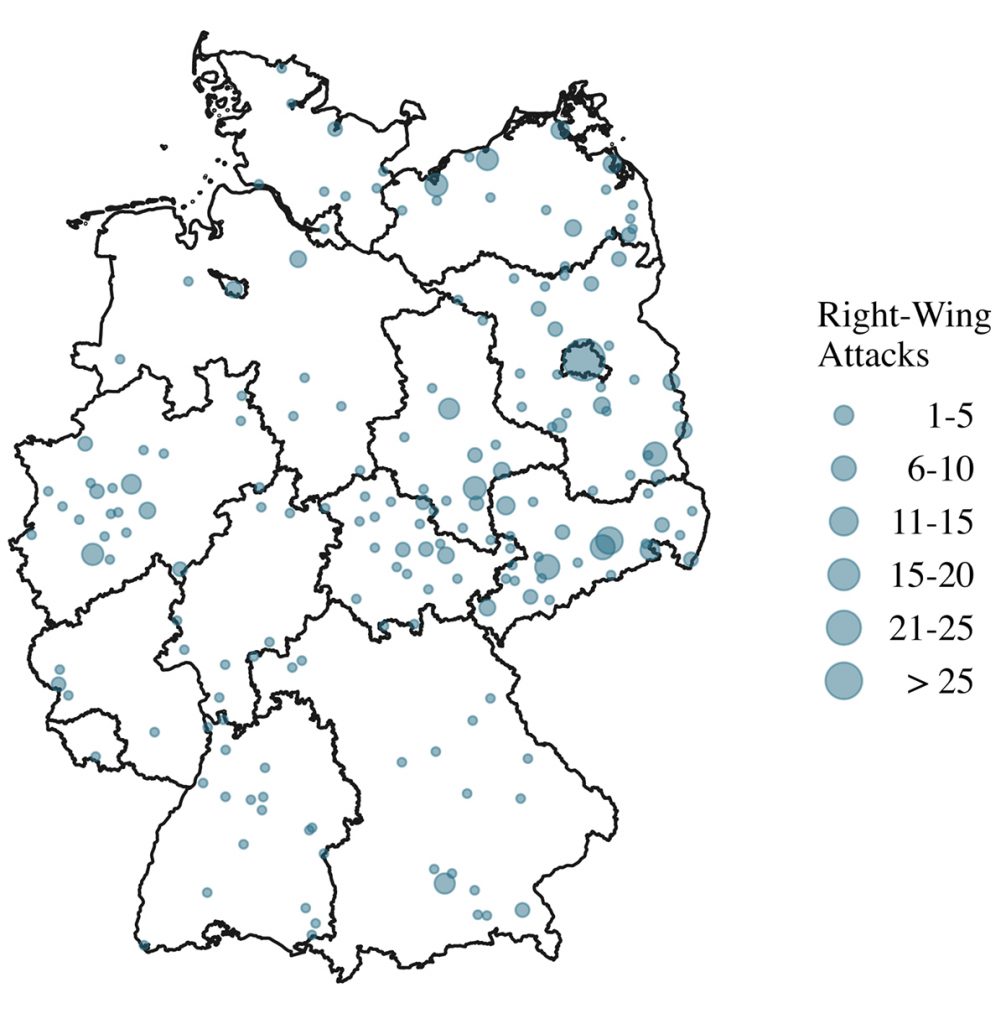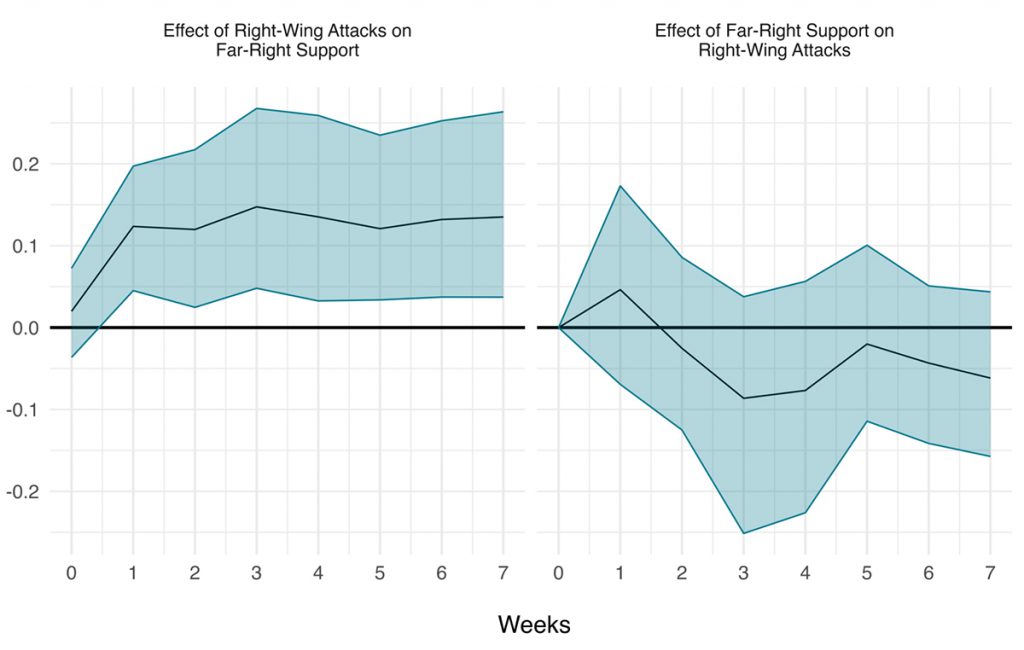Miku Matsunaga and Werner Krause reveal how voters who support radical-right parties are sticking by them, despite the current upsurge in right-wing violence. Their findings raise crucial concerns about the broader ramifications of growing far-right movements across the globe
Violence by white supremacists and right-wing extremists has resurfaced throughout much of Europe and beyond. In countries including the US, the UK, France, and Slovakia, the number of such attacks has been on the rise. Moreover, intelligence services and public pundits identify right-wing extremism and terrorism as one of the most serious dangers to national security. These observations prompt critical questions about how citizens respond to this development. As we see in The Loop's own Future of Populism series, less academic attention has so far been paid to this relationship.
Given the escalation around the world of right-wing attacks, we might assume that citizens would turn away from actors organisationally or ideologically tied to violence. However, the reality is more complex. A more alarming observation is that public support for radical-right parties (RRPs) has not declined in recent years, even amid the current upsurge of violence.
Prominent far-right figures often frame such attacks as the result of increasing immigration. For instance, Matteo Salvini, leader of the Italian party Lega, contextualised the 2019 Macerata shooting in which six African migrants were wounded thus:
It is clear and obvious that out-of-control immigration, an invasion like the one organised, promoted and financed in recent years, leads to social conflict
matteo salvini, 4 February 2018
Even in the face of xenophobic attacks, RRPs portray immigration as a threat to public security and the social fabric. Ultimately — in their view — it will lead to right-wing violence.
Our recent article in Comparative Political Studies examined the connection between right-wing attacks and RRP support in Germany. Our findings indicate that public support for the far right increased after incidents of such violence. The effects are generally moderate in magnitude. However, they serve as a warning about the potential implications of the ongoing rise of the far right.
Germany is one of the countries most affected by xenophobic attacks. In recent years, top politicians, such as current Interior Minister Nancy Faeser and her predecessor Horst Seehofer, have called right-wing violence and terrorism 'the greatest threat to democracy'. At the same time, the far-right Alternative für Deutschland (AfD) has gained substantial electoral ground. The steady rise in violent events included several high-profile shootings, in Munich, Halle, and Hanau. They also involved hundreds of stabbings, incidents of arson, and physical attacks on political opponents, refugees, and other minorities. The map below shows the distribution of far-right attacks since AfD's foundation, according to the Right-Wing Terrorism and Violence Dataset.

Analysing weekly data from 2013 to 2019, we investigated how RRP support developed after increasing right-wing violence. The left plot in the figure below illustrates how the share of citizens stating that they would vote for the AfD changed, on average, after such attacks. Notably, the graph shows that far-right support increased. Simultaneously, the right plot does not reveal a corresponding pattern of increased AfD support preceding violent events. This indicates a lack of reverse causation.

To ensure reliable results, we employed various data sources on right-wing violence from German police and intelligence services, and from NGOs. We also paid particular attention to other explanations for rising AfD support, such as the influx of refugees or immigration media coverage. In addition, our study focuses on the assassination of Walter Lübcke, a member of the centre-right CDU. Lübcke was murdered because of his pro-refugee stance. We consistently found moderate but statistically significant increases in AfD support and anti-immigrant attitudes. This was particularly the case among ideologically right-leaning individuals who had previously voted for the mainstream right.
Voters who stick with far-right parties may agree with narratives alleging that immigration is the 'root cause' of right-wing violence
These results show that parts of the electorate are not backing away from the far right, despite the fact that violent attacks remain ideologically and (often) organisationally tied to RRPs. These voters may agree with narratives alleging that immigration is the ‘root cause’ of right-wing violence. In this regard, research finds that 14% to 19% of German citizens endorse hate crimes. A 2021 poll in the US showed that 30% of Republicans agreed with the statement Because things have gotten so far off track, true American patriots may have to resort to violence in order to save our country.
Comparative research is crucial to gaining a comprehensive understanding of right-wing violence. Yet few studies have assessed the complex relationship between attacks, far-right party support, and societal factors such as immigration numbers. Reactions to political violence may differ significantly across countries.
Investigating specific country characteristics, such as media discourse, could provide valuable insight into voters' willingness to distance themselves from RRPs
Events such as the 2016 assassination of Jo Cox in the UK, and the Oslo and Utøya attacks in 2011, weakened support for right-wing positions. In this regard, investigating the role of country characteristics, such as media discourse, could provide valuable insight into voters' reactions, and their willingness to distance themselves from RRPs.
Combatting the spread of hateful ideas and their political influence requires a deep understanding of the societal dynamics surrounding political violence. This knowledge holds substantial significance for political actors, activists, public pundits, and journalists alike. Contrary to expectations, our research finds that public support for far-right parties has not decreased. This phenomenon thus challenges assumptions that voters would turn away from political actors associated with such violence. Understanding the reasons behind this response is essential to counteract right-wing hatred effectively.
[…] Die Studie deckt auf, dass die AfD von rechtsextremen Gewaltakten profitiert, indem sie diese Ereignisse in ihrem politischen Narrativ verwendet. Rechtsextreme Parteien, wie die AfD, neigen dazu, solche Angriffe als direkte Folge von Migration und als Bedrohung für die öffentliche Sicherheit und das soziale Gefüge darzustellen. Dieses Framing scheint bei einem Teil der Wählerschaft Anklang zu finden. Paradox: Ihre Gesinnungsgenossen töten wegen rechtsextremer Ideologie, wie man sie auch in der AfD findet, und die AfD schafft sogar, selbst ihren eigenen Hass Schutzsuchenden in die Schuhe zu schieben. A la: „Wenn Ausländer nicht hier wären, müssten wir sie und unschuldige Unbeteiligte umbringen!“ Die Autoren der Studie schreiben: […]
[…] Die Studie deckt auf, dass die AfD von rechtsextremen Gewaltakten profitiert, indem sie diese Ereignisse in ihrem politischen Narrativ verwendet. Rechtsextreme Parteien, wie die AfD, neigen dazu, solche Angriffe als direkte Folge von Migration und als Bedrohung für die öffentliche Sicherheit und das soziale Gefüge darzustellen. Dieses Framing scheint bei einem Teil der Wählerschaft Anklang zu finden. Paradox: Ihre Gesinnungsgenossen töten wegen rechtsextremer Ideologie, wie man sie auch in der AfD findet, und die AfD schafft sogar, selbst ihren eigenen Hass Schutzsuchenden in die Schuhe zu schieben. A la: „Wenn Ausländer nicht hier wären, müssten wir sie und andere unschuldige Unbeteiligte nicht umbringen!“ Die Autoren der Studie schreiben: […]